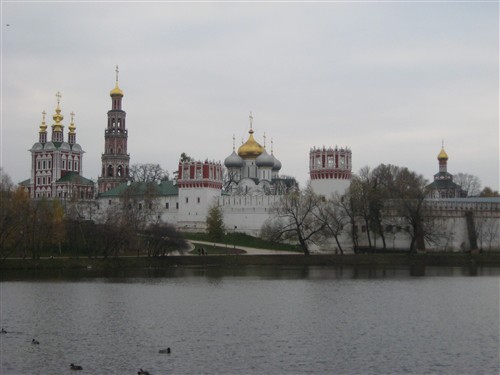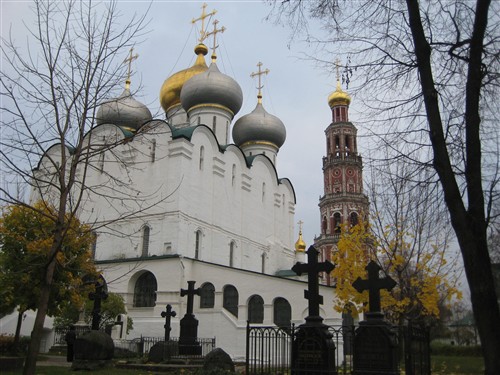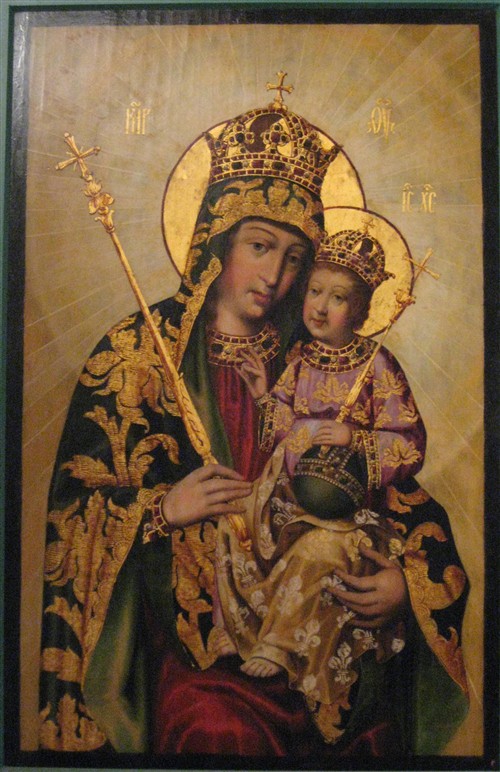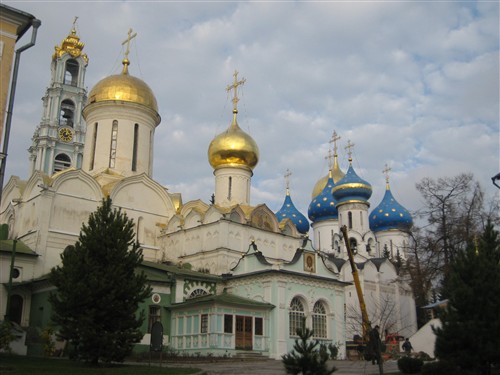Posted under Russia

Having already explored our Moscow must-sees, we committed the following two days to some sights further away. Two monasteries had piqued our interest for their splendor and their proximity to Moscow – Novodevichy, on the outskirts of town, just a short metro ride away, and the Trinity Monastery of St Sergius, located in the nearby town of Sergiev Posad.
 Novodevichy Monastery is located southeast of the city center on the Moscow River. Founded in 1524 to celebrate the retaking of Smolensk from Lithuania, it later served as a strategic watch guard, alerting the city of potential invaders. Today the beautiful white-walled complex with red-and-white baroque turrets, shines brightly against the backdrop of a small suburban lake and park. The obligatory gilded onion domes crown the bell tower and cathedrals housed within the fortress. Before we entered the monastery, we admired the view from afar with a lazy walk around the adjacent lake. With the trees holding on to their last golden leaves and the monastery reflecting on the windswept lake, I was, of course, in photography heaven.
Novodevichy Monastery is located southeast of the city center on the Moscow River. Founded in 1524 to celebrate the retaking of Smolensk from Lithuania, it later served as a strategic watch guard, alerting the city of potential invaders. Today the beautiful white-walled complex with red-and-white baroque turrets, shines brightly against the backdrop of a small suburban lake and park. The obligatory gilded onion domes crown the bell tower and cathedrals housed within the fortress. Before we entered the monastery, we admired the view from afar with a lazy walk around the adjacent lake. With the trees holding on to their last golden leaves and the monastery reflecting on the windswept lake, I was, of course, in photography heaven.
 The compound is still an operating monastery but the highlights for us were the two special exhibits which displayed the monastery’s impressive collection of Orthodox iconography, art and religious artifacts. There were other notable sights including the Smolensk Cathedral, an imposing bell tower, and the adjacent Novodevichy Cemetery – final resting place for several famous (and infamous) Russians.
The compound is still an operating monastery but the highlights for us were the two special exhibits which displayed the monastery’s impressive collection of Orthodox iconography, art and religious artifacts. There were other notable sights including the Smolensk Cathedral, an imposing bell tower, and the adjacent Novodevichy Cemetery – final resting place for several famous (and infamous) Russians.
The next day we traveled to the town of Sergiev Posad, known as Zagorsk during the Soviet era, and a relatively easy 90-minute trip on the suburban “express” (read: painfully slow) train. Securing tickets was challenging (language barriers and poor signage have made arranging all of our transportation in Russia rather difficult) but the destination was worth the effort. Like so many of the Russian Orthodox monuments that we’ve seen, the Trinity Monastery of St Sergius was striking from a distance, dotting the skyline with its signature onion domes. But the monastery is more than a beautiful postcard picture. It is also a pilgrimage destination for scores of Russian Orthodox Christians who come to venerate the tomb of St Sergius, one of Russia’s most revered saints. St Sergius is entombed within the Trinity Cathedral, where a memorial service is performed for him all day, every day.

In addition to the Trinity Cathedral, the monastery is home to several brilliant buildings. These include the Assumption Cathedral, adorned with its unique star-spangled royal blue onion domes, and a tall, attractive baroque bell tower. We were disappointed to find that many of the buildings that we wanted to see, including the vestry (where the monastery’s opulent treasury is stored), were closed on the day of our visit.
We thoroughly enjoyed our time spent at the monasteries and the metro/train rides added an interesting element of adventure to the days’ exploits. Witnessing a country’s public transport is a true looking glass into its culture. In Russia, millions of people use these services daily, stretching the aging infrastructure to its limits. All of our travels in Russia have been aboard the same trains and buses used by the masses. We’ve been crammed into subway stations during rush hour and sandwiched between locals on long suburban train rides. But it’s all part of the fun. There is a saying that I love: “The journey is the destination.” And nowhere is this more true than in Russia.
Comments Off on Moscow’s Monasteries
